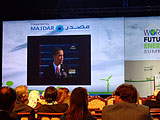US-UAE Nuke Deal Questionable
By Dominic Moran for ISN
President Barack Obama has sent a cooperation agreement establishing the basis for US involvement in the nascent UAE energy reactor program to Congress, in a move likely to have significant repercussions.
Obama could have rejected the "123 Agreement," which was signed by the outgoing Bush administration in January. However, to do so would have put the White House at loggerheads with an important ally at a time when US hegemony in the Gulf is under increasing pressure.
The Emirates' ability to pay for turnkey reactors is particularly significant for US reactor fabricator General Electric in its intense competition with a French-backed consortium and Korea Electric Power Corp for the first reactor contracts.
The French are pushing particularly hard for a role in the UAE program, with Areva, Total and Suez joined by EDF late last month in a revised two-reactor offer first submitted to the UAE in January 2008.
As the competition for reactor contracts intensifies, the UAE-US pact could sound the death knell for the mooted Gulf Cooperation Council (GCC) nuclear program, further undermining Gulf integration efforts.
Disturbingly, this impression was reinforced by what looked to be a quid pro quo whereby the UAE, already peeved at the decision that Riyadh would host the GCC central bank, pulled out of the planned GCC monetary union in the same week that the “123 Agreement” was passed on to Congress.
Under external pagereportedlycall_made intense US pressure, the UAE agreed to maintain the dirham's controversial dollar peg just prior to the Obama administration's decision to send the nuclear pact to Congress.
For the UAE, which has pressing electricity needs, large oil reserves and a strong record of renewable energy development, the move toward a nuclear energy capacity is an important, but not inevitable element of generation capacity extension.
As with other plans for Middle East nuclear energy programs, civil atomic development cannot be viewed in a vacuum given the perceived threat posed by the Iranian nuclear program. Indeed, Gulf states have reversed their historic rejection of atomic development in a thinly veiled response to the Iranian nuclear crisis.
Despite this, there is no reason to disbelieve UAE officials' assertions that their program will be transparent and feature strong international safeguards mechanisms, or to suppose that there are plans for weaponization at this point.
Seeking to allay US concerns, the UAE has moved to tighten controls following the utilization of Dubai by the AQ Khan nuclear network. However, the complete attenuation of illicit trafficking appears unlikely.
The Emirati eschewal of independent fuel cycle work and planned signing of the IAEA Additional Protocol are insufficient to totally allay concerns regarding both the security of nuclear materials and technologies and the impact of development on prospects for wider regional proliferation.
There is also no clear extant UAE plan for the handling and storage of nuclear waste and a troubling dearth of experience in nuclear R&D, safety and security.
From day one the understandable desire for program indigenization will be present, meaning that the influence of foreign suppliers, operators and governments over the UAE program will wane over time.
The Indian and UAE 123 Agreements set an important benchmark for the future role of the US in Middle East nuclear programs, but over time are likely to work more as a foot in the door for nascent nuclear states than an effective guard against proliferation.
Ultimately, it seems this deal will be passed by Congress under intense lobbying. Whether this is advisable or not will figure into a decision.

